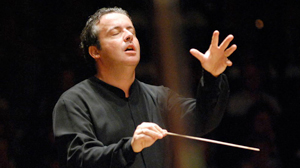by Mike Telin

On Thursday, February 12 at 7:30 pm and Saturday, February 14 at 8:00 pm, Juanjo Mena will make his Cleveland Orchestra debut with a program featuring works by Jean Sibelius and Arnold Schoenberg. Mena, who is Chief Conductor of the BBC Philharmonic in Manchester, UK, has been rapidly gaining attention in North America. This season he is making return visits to the orchestras of Los Angeles, Boston, Philadelphia and Pittsburgh, as well as debuts with the New York Philharmonic and the Montreal Symphony in addition to Cleveland.
Mena will begin this week’s concerts with Sibelius’s Symphony No. 7. Completed in 1924, the symphony is written in a single movement as opposed to the standard four-movement formula. “I love this symphony,” Mena said. “It is a thing of beauty, and it established a new structure for the symphony with its single thread that connects one theme to the next. It’s very complicated to achieve the correct balance between the contrasts and styles of the different themes, and to continue them in a long line without losing tension is very difficult. It takes a composer like Sibelius to do something this special. That’s why I think it is a masterwork.”
The program will continue with another work by Sibelius, the Violin Concerto, featuring Alina Ibragimova as soloist. Although written in 1904, following a less than favorable premiere, Sibelius made major revisions to the work the following year. Since then the concerto has gone on to become one of the great standards of the violin concerto canon. The concerto has also been very popular with The Cleveland Orchestra. According to archivist Deborah Hefling, the concerto was first performed on January 5 and 7 in 1922. The first Severance Hall performance was in 1943, and since then it has been played seventeen times on subscription concerts. The concerto has received ten Blossom Music Center performances and has been taken on tour on nine occasions.
What does Mena find appealing about the work? “It’s the same as with the symphony. The structure is so different from the other standard concertos, like Tchaikovsky and Brahms. I think it’s a concerto to surprise—some of the themes seem to be going one place, but then they change and go in another direction.”
Mena also looks forward to working with Alina Ibragimova for the first time. “I know her playing and her approach to the music of Szymanowski, Ravel and other contemporary works. I think she is a very interesting musician and I know we will have a wonderful performance.”
The program will conclude with Schoenberg’s symphonic poem Pélleas and Mélisande. Mena, who enjoys conducting contemporary music, feels this is an important work because it comes from a period of musical transition. “I think it is important to know the pieces that are in the middle—from that transition period to the present. To understand contemporary music, we must first understand works like Verklärte Nacht and Gurrelieder, as well as the works of Szymanowski, Martinů, and of course Debussy.”
Mena also thinks that the Schoenberg and the Sibelius symphony complement each other perfectly. “Like the symphony, Pélleas is one musical thread, so I like to have them on the same program. They have different musical languages, but the same concept—the long arch that connects the themes in addition to connecting to humanity.”
What led Juanjo Mena to decide to become a conductor? “I think I always wanted to be a conductor. Nothing else was really an option for me.” Although he did not come from a musical family, he was encouraged by his father to become involved in music. He joined the school choir at age seven and soon began to play the clarinet in band. Then, at age 16 he had the opportunity to conduct a 100-voice choir. “It was a big part of my life, and I learned so much about how conducting works. People think it is only about learning the score, but it’s more than that. It’s about studying how to connect with the people in front of you: to learn about them, and together bring the music to the audience. When students come to me, I tell them the good things to say and the things not to say. I tell them that we are humans, and we will react to what is happening in the moment. I also tell them that you are naked in front of the orchestra and after two seconds the musicians will know who you are and if you know what you are doing.”
With all of his successes Mena, more than ever, is faced with the challenge of balancing a career with his personal life. “It’s not easy because I also have a family. I was in Italy last week and now I’m in Manchester with my orchestra. It’s a lot of work here with the BBC, sometimes two or three different programs a week. It is amazing to work in this place, and I am learning a lot. But it’s true, I have to balance. My children in the Basque country in Spain need to be taken to school and to music, and with my work things have not been getting easier. But when I am at home with my family, family is full-time. But we must try to be balanced. If you go someplace to conduct and you don’t feel well because you have left your family and because of that you don’t conduct well—then what? You can conduct an orchestra one time, but the important thing is to be invited back.”
Published on ClevelandClassical.com February 10, 2015.
Click here for a printable copy of this article


